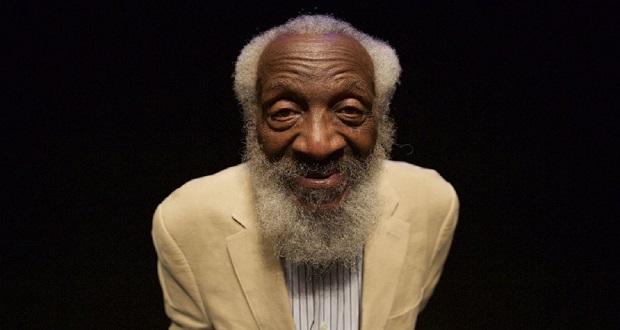Pioneering comedian and trailblazing Civil Rights activist Dick Gregory died on Saturday at the age of 84. Gregory is often noted as the first African American comedian to gain widespread recognition and praise with white audiences, and he was known for sharing hard truths about the experiences of Black people in the United States through his comedy.
Beyond comedy, and often through it, he was deeply committed to justice. He participated in the March on Washington in 1963 and the Selma to Montgomery March in 1965. He ran for mayor of Chicago in 1967 and for president under the Freedom and Peace Party in 1968. He protested the Vietnam War by going two and a half years without solid food and again went on hunger strike in 2000 to protest police brutality.
Gregory, who was jailed and beaten, shot in the knee, and arrested countless times for his actions during the Civil Rights movement of the 1960s and 1970s, was profoundly funny, profoundly non-violent, and profoundly insightful about the American experience of race and justice.
National Urban League President Marc H. Morial had this to say in the wake of Gregory’s passing: “With the nation facing a crisis of racial hostility, we would do well to be guided by his unwavering dedication to justice.” Comedian Chris Rock lamented that “The America that produced Dick Gregory still exists.”
In America today, in this time of “racial hostility”, what is the place of comedy? Does comedy still have the power to change hearts and minds towards justice? We hear so much about echo chambers, liberal and conservative bubbles, and social media silos, but can comedy cross those boundaries? Much has been said about the resurgence of late night comedy in the Trump era, with Seth Meyers, Stephen Colbert, Trevor Noah, and Jimmy Kimmel taking their nightly digs at the president. We also have comedic powerhouses and innovators like Issa Rae, Jessica Williams, Chris Rock, and Michael Che – Black voices talking about their everyday experiences, joys and struggles and connecting with diverse and intersectional audiences (see this GenY on D&I post on stereotype threat in Insecure).
We should support these artists and performers who, like Gregory did, are using their craft as a vehicle for the truth – or their truths. However, we can also learn from Dick Gregory’s pursuit of justice in communities, in the streets, and in the world amidst great obstacles and great division. We are in the midst of a civil rights movement of our own, and we have to discern for ourselves what it means to take what we learn from those entertainers that challenge and affirm us and strive to live inclusively in a divisive world.
Dick Gregory’s life is a reminder to tell the truth, to be yourself, and to face the challenges of our time with an unwavering stance towards justice.



















